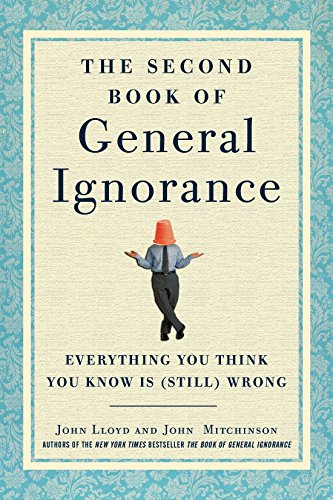The Second Book of General Ignorance: Everything You Think You Know Is (Still) Wrong / John Lloyd, John Mitchinson
| List Price: | |
Our Price: $23.00 | |
|
For Bulk orders
| |
|
Used Book Price: $4.22 | |
| The Second Book of General Ignorance: Everything You Think You Know Is (Still) Wrong / John Lloyd, John Mitchinson | |
| Publisher: Crown | |
| Availability:Usually ships in 24 hours | |
| Sales Rank: 33070 | |
|
Similar Books
Q&A with Authors John Lloyd & John Mitchinson
After two books, what’s the one fact that stands out as your favorite? The one you find yourself still bringing up in dinner conversation?
There are so many. And they change, depending on what one is researching, so often the ‘favourite’ is merely the most recent. The one we often come back to is that for the first 21 years after basketball was invented in 1891, it didn’t occur to anyone to cut a hole in the bottom of the basket. Until 1912, every time anyone scored, someone had to climb a ladder up to the basket or poke the ball out with a long pole. Then there’s female mosquitoes being the only ones that bite you. Oh, and of course, the strange reproductive layout of the female kangaroo… Stop us now! Do we think there’s enough out there we still don’t know for a third book? A fourth? A tenth?
Absolutely. The next books will be slightly different in format, but it’s an important part of our philosophy that absolutely anything is interesting if looked at long enough and int the right way. It’s like the levels of magnification on a microscope. Each level brings a new world of detail. So what might appear to be unremarkable and ordinary – like water for example – turns out to be the weirdest stuff in the known universe, able to coexist in three different states simultaneously. So far there are 66 listed anomalies of water. So, we are pretty confident that we can fill as many books as our esteemed publishers are prepared to commission (hint, hint…) If you had to choose, do you think the general reader is more interested in acquiring knowledge or in being able to tell others that they’re wrong?
I don’t think anybody likes being told they’re wrong. What we aim to do is to say – ‘hang on, there’s a little more to it than that’. Or even ‘Look over here, there’s some really great stuff nobody’s noticed’. What drives us as a species is curiosity: we want to know how things work and we are remarkably generous in sharing what we find with others. When you find a great fact (or quote or one-liner), there’s an overwhelming need to share it with the next ten people you meet. It’s in that spirit that the books are written. Compare British vs. American ignorance…
There are obvious stereotypes – American’s aren’t supposed to know or care about other countries – but we enjoy overturning those. In fact, we’ve always found Americans to be fantastically curious about the world around them – look at all the factual TV channels. And the Brits talk a good game – we always sound like we know stuff – but don’t be fooled. A recent poll about our Civil War found that ninety percent of Britons couldn’t name a single battle; eighty percent do not know which English King was executed by Parliament in 1649; and sixty-seven percent of schoolchildren have never heard of Oliver Cromwell. I don’t think we’d have sold the book in 30 languages if ignorance weren’t a universal phenomenon. Would you like to be an immortal jellyfish?
On balance, no. They have very poor eyesight and no real brain. Plus their mouths and bottoms are interchangeable. I think being able to live forever under those grim conditions isn’t so appealing. We both very much like the word ‘polyp’ though (it originally meant ‘many-footed’ in Greek but is used to describe the immature jellyfish). We could introduce our kids as ‘a shoal of polyps’ – a very satisfying sentence to pronounce. Do you ever get told you’re wrong (especially by someone who quotes your book back at you)?
Frequently. We do get stuff wrong. We said the Welsh had no word for ‘blue’ (they do – glas). We said the male kangaroo’s member has a split ending: it doesn’t. But this is all to the good. We never claim to be always right – that’s the point: no one ever is. The books are meant to inspire the reader to find things out for themselves and add to their own pile of interest and wonder. Which John is the most ignorant?
We get more ignorant the more we know. John M knows very little about embroidery. I mean – almost nothing. And John L – don’t ask him about 17th Dutch porcelain. He’s interested, don’t get us wrong. He just hasn’t had time to study the form. Neither of us fully understands the rules of American football; neither of us have ever been to Nauru (although we know there are no dry cleaners on the island because the former President used to airfreight his trousers to Melbourne, 2,500 miles away, to get them cleaned and pressed.) How do you two Johns work together so well? What’s your process for coming up with questions/answers?
We are very fortunate to have a small group of researchers who have complimentary areas of knowledge. They track down and source a huge percentage of our facts. John and I ask lots of questions and try to shape the basic research into something that entertains and informs simultaneously. QI isn’t about lists of trivial facts, as we’ve said, it’s about making connections. We’re burrowers not grazers. What starts out as a simple observation - why do pigeons not fly away from an oncoming car until the last moment? - might lead to an investigation into how the brain processes visual information; the truth about carrots and night vision; the history of pigeons as a communication device; the Dickin Medal for Animal Bravery; how migratory animals navigate; the chemical constitution of bird dung; the design and ornamentation of medieval dovecotes… It’s like making a lovely rich soup. We work well together because we love what we do. It’s a relationship based on trust, humour, and friendship. Oh, and beer also helps. What do you hope readers will take away from the General Ignorance books?
Hopefully the sense of the world being a much richer and wonderful place than it might at first appear. And that nobody knows the whole truth.
Now you can buy Books online in USA,UK, India and more than 100 countries.
*Terms and Conditions apply
Disclaimer: All product data on this page belongs to
 .
.No guarantees are made as to accuracy of prices and information.










